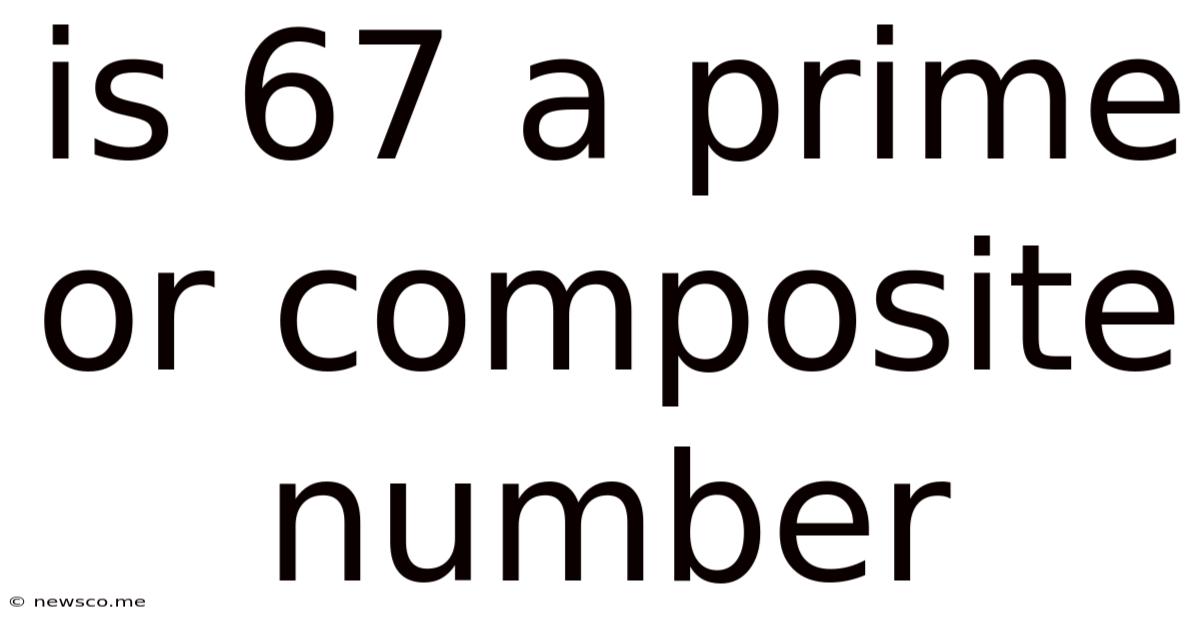Is 67 A Prime Or Composite Number
News Co
Mar 30, 2025 · 5 min read

Table of Contents
Is 67 a Prime or Composite Number? A Deep Dive into Number Theory
Determining whether a number is prime or composite is a fundamental concept in number theory. This article will explore the properties of prime and composite numbers, focusing specifically on whether 67 is prime or composite. We'll delve into the methods for determining primality, examine the significance of prime numbers in mathematics, and touch upon some related concepts.
Understanding Prime and Composite Numbers
Before we investigate the number 67, let's clarify the definitions:
-
Prime Number: A prime number is a natural number greater than 1 that has no positive divisors other than 1 and itself. In simpler terms, it's only divisible by 1 and itself. Examples include 2, 3, 5, 7, 11, and so on.
-
Composite Number: A composite number is a natural number greater than 1 that is not a prime number. This means it has at least one divisor other than 1 and itself. Examples include 4 (2 x 2), 6 (2 x 3), 9 (3 x 3), and so on.
-
The Number 1: The number 1 is neither prime nor composite. This is a crucial distinction.
Methods for Determining Primality
Several methods exist to determine whether a number is prime. For smaller numbers like 67, we can use relatively simple techniques. For larger numbers, more sophisticated algorithms are necessary.
Trial Division
The simplest method is trial division. We check if the number is divisible by any prime number less than its square root. If it's not divisible by any of these primes, it's a prime number. Let's apply this to 67:
The square root of 67 is approximately 8.18. Therefore, we need to check for divisibility by prime numbers less than 8.18: 2, 3, 5, and 7.
- 67 is not divisible by 2 (it's odd).
- 67 is not divisible by 3 (6 + 7 = 13, which is not divisible by 3).
- 67 is not divisible by 5 (it doesn't end in 0 or 5).
- 67 is not divisible by 7 (67 / 7 ≈ 9.57).
Since 67 is not divisible by any of these prime numbers, we can conclude that 67 is a prime number.
Other Primality Tests
For larger numbers, more efficient algorithms are needed. Some examples include:
-
Sieve of Eratosthenes: This is an ancient algorithm for finding all prime numbers up to a specified integer. It's not the most efficient for testing a single large number, but it's effective for finding all primes within a range.
-
AKS Primality Test: This is a deterministic polynomial-time algorithm, meaning it can determine the primality of a number in polynomial time. This is a significant achievement in number theory, although it's not always the most practical for very large numbers due to its complexity.
-
Probabilistic Primality Tests (e.g., Miller-Rabin): These tests don't guarantee primality but provide a very high probability of correctness. They are often used for larger numbers due to their efficiency.
The Significance of Prime Numbers
Prime numbers are fundamental building blocks in number theory and have far-reaching applications in various fields:
-
Cryptography: Prime numbers are essential in modern cryptography, forming the basis of many encryption algorithms like RSA. The security of these algorithms relies on the difficulty of factoring large composite numbers into their prime factors.
-
Number Theory Research: Prime numbers are central to numerous unsolved problems in number theory, such as the Riemann Hypothesis, which deals with the distribution of prime numbers.
-
Computer Science: Algorithms related to prime numbers are used in various computer science applications, including hashing, random number generation, and data structures.
-
Coding Theory: Prime numbers play a role in error-correcting codes, which are used to ensure data integrity during transmission.
Exploring the Properties of 67
Now that we've established that 67 is a prime number, let's explore some of its properties:
-
It's an odd prime number: All prime numbers greater than 2 are odd.
-
It's a Sophie Germain prime: A Sophie Germain prime is a prime number p such that 2p + 1 is also prime. In this case, 2 * 67 + 1 = 135, which is not prime (135 = 3^3 * 5). Therefore, 67 is not a Sophie Germain prime.
-
It's a Chen prime: A Chen prime is a prime number p such that p + 2 is either a prime or a semiprime (a product of two primes). 67 + 2 = 69, which is a semiprime (3 x 23). Therefore, 67 is a Chen prime.
-
It's a safe prime: A safe prime is a prime number of the form 2p + 1, where p is also a prime number. Since 67 is not of this form, it’s not a safe prime.
Conclusion: 67 is Prime
Through trial division and our understanding of prime number properties, we've definitively shown that 67 is a prime number. This seemingly simple fact holds a significant place within the vast and intricate world of number theory and its numerous applications in mathematics, computer science, and cryptography. The exploration of prime numbers continues to fascinate mathematicians and researchers, driving innovation and expanding our understanding of fundamental mathematical concepts. Further exploration of prime number distribution, algorithms for primality testing, and their applications in cryptography will continue to be a significant area of research for years to come. The seemingly simple question of whether 67 is prime opens the door to a deeper appreciation for the elegance and complexity of number theory.
Latest Posts
Related Post
Thank you for visiting our website which covers about Is 67 A Prime Or Composite Number . We hope the information provided has been useful to you. Feel free to contact us if you have any questions or need further assistance. See you next time and don't miss to bookmark.